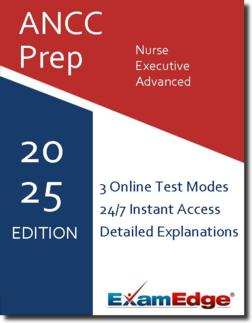ANCC NEA-BC Practice Tests & Test Prep by Exam Edge - Blogs
Based on 34 Reviews
- Real Exam Simulation: Timed questions and matching content build comfort for your ANCC Nurse Executive - Advanced test day.
- Instant, 24/7 Access: Web-based ANCC Nurse Executive - Advanced practice exams with no software needed.
- Clear Explanations: Step-by-step answers and explanations for your ANCC exam to strengthen understanding.
- Boosted Confidence: Reduces anxiety and improves test-taking skills to ace your ANCC Nurse Executive - Advanced (NEA-BC).

Exam Edge Blogs for ANCC Nurse Executive - Advanced

The Best Certification for Nurse Managers: Top Picks & Benefits
While nurses are known as caretakers and versed medical professionals, they are, though less famously, often also great leaders and managers. The j...
Read More
Charge Nurse vs Nurse Leader: Roles, Responsibilities & Career Growth
There comes a point in a person’s career when it’s time to advance to jobs with more responsibility and control. The same thing happens with nurses. L...
Read More
Nurse Leader vs Nurse Manager: Key Differences & Career Paths
When choosing the next step in your career path, it’s important to understand the opportunities that are out there and what sets them apart. Sometimes...
Read More
NEA-BC Certification Renewal Guide: Advance Your Nursing Career
The NEA BC exam is known for its intricate nature covering various key subjects such as leadership, health care delivery, quality and safety, and huma...
Read More
NE-BC vs NEA-BC: Nurse Executive Certifications Compared
In the nursing profession, certifications serve as important milestones, demonstrating a nurse's specialized skills and commitment to career advanceme...
Read More
NEA-BC Requirements Explained
For nursing executives who have attained a higher level of expertise and knowledge, the ANCC Nurse Executive NEA-BC Certification is a prestigious ach...
Read More
How Hard is the NEA-BC Exam: Certification Guide
For nurse executives who want to take their careers to new heights, not many nursing-related credentials are as widely coveted as the Nurse Executive ...
Read MoreExam Edge Blogs for ANCC Nurse Executive - Advanced

The Best Certification for Nurse Managers: Top Picks & Benefits
While nurses are known as caretakers and versed medical professionals, they are, though less famously, often also great leaders and managers. The j...
Read More
Charge Nurse vs Nurse Leader: Roles, Responsibilities & Career Growth
There comes a point in a person’s career when it’s time to advance to jobs with more responsibility and control. The same thing happens with nurses. L...
Read More
Nurse Leader vs Nurse Manager: Key Differences & Career Paths
When choosing the next step in your career path, it’s important to understand the opportunities that are out there and what sets them apart. Sometimes...
Read More
NEA-BC Certification Renewal Guide: Advance Your Nursing Career
The NEA BC exam is known for its intricate nature covering various key subjects such as leadership, health care delivery, quality and safety, and huma...
Read More
NE-BC vs NEA-BC: Nurse Executive Certifications Compared
In the nursing profession, certifications serve as important milestones, demonstrating a nurse's specialized skills and commitment to career advanceme...
Read More
NEA-BC Requirements Explained
For nursing executives who have attained a higher level of expertise and knowledge, the ANCC Nurse Executive NEA-BC Certification is a prestigious ach...
Read More
How Hard is the NEA-BC Exam: Certification Guide
For nurse executives who want to take their careers to new heights, not many nursing-related credentials are as widely coveted as the Nurse Executive ...
Read More

